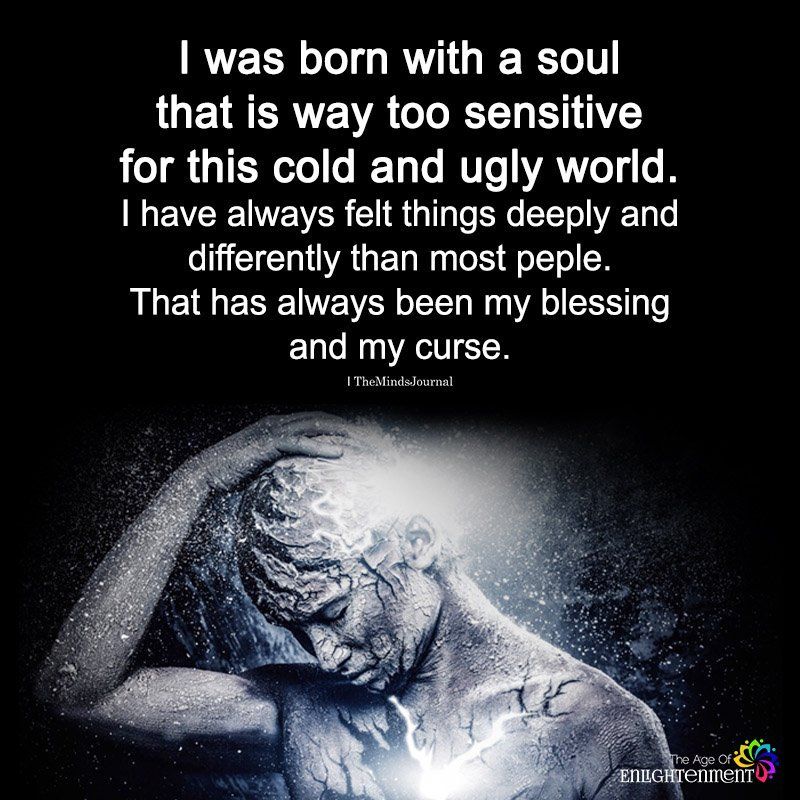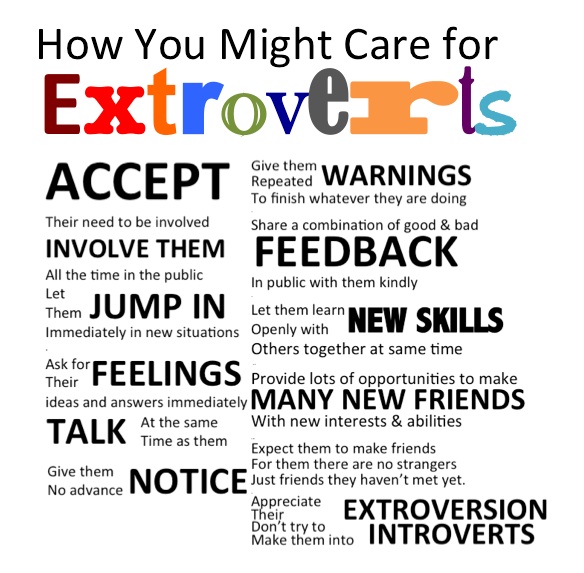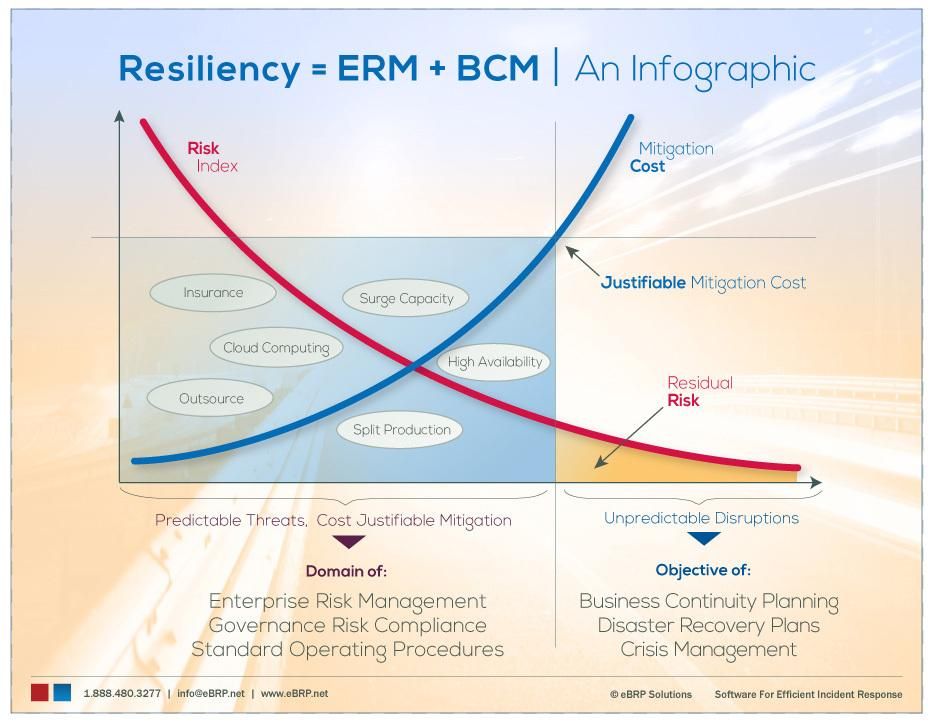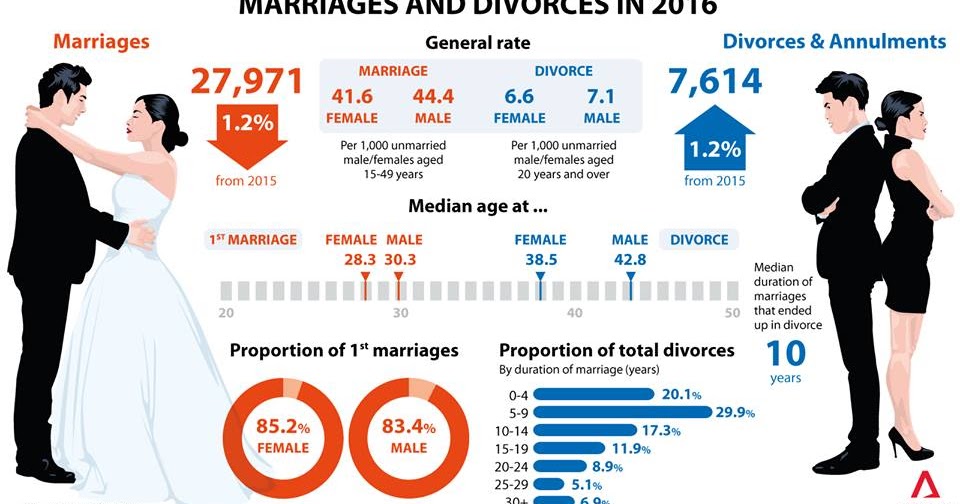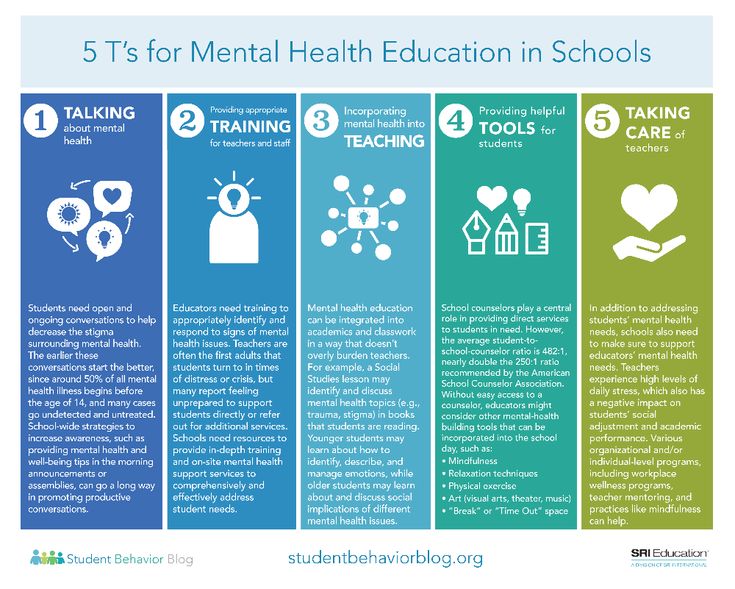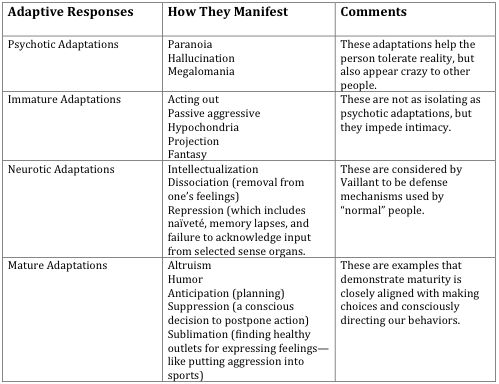Being too sensitive
Help Me Understand: Why Am I So Sensitive?
Do you ever find yourself wondering why you’re so sensitive? If you feel things deeply, you may be a highly sensitive person.
Sensitivity is often framed as a negative personality trait. You may have been told that you’re too sensitive or overemotional and that you need to “toughen up.” Maybe you wonder, why am I so sensitive?
It’s important to understand that sensitivity is a personality trait. Being “too” sensitive is not a disorder. Like being quiet or being thoughtful, it’s not necessarily a bad trait, even though each can pose its challenges.
Several potential causes of sensitivity exist. For example, if you have a neurodevelopmental disorder like autism or ADHD, you might be more sensitive to certain stimuli.
Your sensitivity may not be linked to any particular disorder, though. If you feel things deeply, you could be a highly sensitive person (HSP).
Do you feel a cold coming on before outward symptoms show up? Do you notice that a lamplight is about to go out a day or two before it does because of slight dimming? Or are you deeply moved by someone else’s good or bad news just by picking up on their subtle expressions?
Why am I so emotional?
There can be many different reasons. Sometimes, we become more emotional when we go through difficult or stressful times. Recent bereavement, trauma, and stress can make us feel more emotional.
Some people tend to be emotionally sensitive because it’s a part of their personality. A highly sensitive person is someone who feels things strongly, whether those things are positive or negative. This can include their own emotions, the emotions of others, and sensory stimuli in the world around them.
A note on being highly sensitive vs. exceptionally emotional
We often use the words “sensitive” and “emotional” interchangeably. And indeed, highly sensitive people are more attuned to emotions.
One of the main distinctions between being exceptionally emotional and being highly sensitive is that highly sensitive people are very attuned to their emotions as well as the emotions of others.
Highly sensitive people also tend to be more sensitive to external stimuli, like lights, noises, and colors, as well as internal stimuli, like hunger and pain.
Another difference is that being highly emotional could be temporary while being a highly sensitive person is a part of your personality.
If you’ve been feeling emotional lately, several stressors could be contributing to it.
Highly sensitive people often feel emotions and respond to stimuli — both in themselves and others — profoundly.
About 15–20% of the population is thought to be highly sensitive.
While many highly sensitive people are dismissed as “too sensitive,” their perceptiveness can be a strength.
The discovery of the HSP
The term “highly sensitive person” was popularized by clinical psychologist Elaine N. Aron, who wrote the book “The Highly Sensitive Person: How to Thrive When the World Overwhelms You.”
First published in 1996, this book is based on years of Aron’s research into being a highly sensitive person herself.
Sensory processing: Like being a human sponge
HSP are folks who are strong in a personality trait known as sensory processing sensitivity.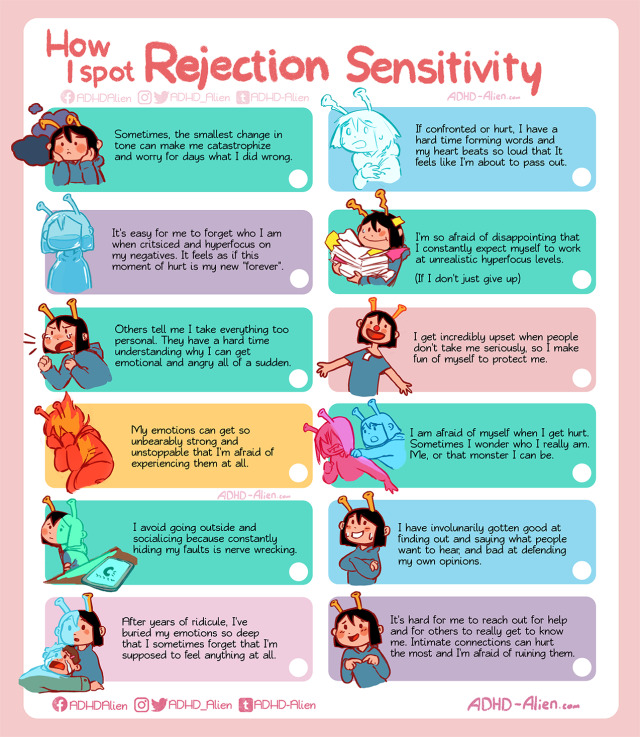 This is not a disorder or a mental illness, but rather a part of your personality.
This is not a disorder or a mental illness, but rather a part of your personality.
Sensory processing relates to how you take in stimuli, including sounds, sensations, others’ moods, smells, and more. HSP often experience these stimuli easily, absorbing like a sponge.
In daily life
If you’re highly sensitive, you might be deeply bothered by violent movies or graphics. You might also be easily overwhelmed by a busy or noisy environment, such as a crowded mall or business conference.
Or, you might be able to savor pleasant stimuli intensely — a good meal, a wonderful song — on a deeper level. Your sensitivity to others’ feelings might help you cultivate strong relationships.
Understanding your sensitivity can be the key to managing overwhelm and leaning into the pleasurable aspects of being an HSP.
Aron’s research found being an HSP is an innate trait, identified in over 100 species.
However, others might learn to be sensitive for several reasons. A traumatic event might put them on high alert, for example. Being sensitive to stimuli is also a symptom of conditions like ADHD and autism.
A traumatic event might put them on high alert, for example. Being sensitive to stimuli is also a symptom of conditions like ADHD and autism.
Over years of research, Aron identified a few common characteristics among highly sensitive people.
These traits include:
- having empathy toward others
- engaging in people-pleasing
- being sensitive to loud noises, chaotic scenes, and busy crowds
- often feeling overwhelmed by sensory stimuli or emotional experiences
- being sensitive to caffeine and medication
- having increased self-awareness
- being able to deeply savor and appreciate pleasant sensations
- avoiding violent and tense movies or books
- avoiding overwhelming situations
- often needing to retreat into a relaxed, quiet space
- having strong emotional responses
Not all HSP will have all the above traits. Therapy and self-work can help you address some of the more harmful tendencies or unpleasant experiences.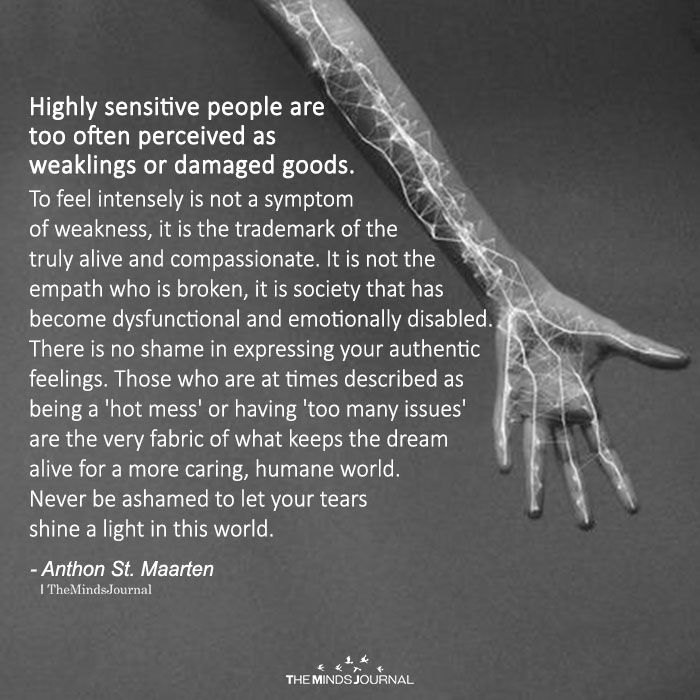
Contrary to what many people assume, highly sensitive people are not always introverted. It’s estimated that around 30% are extroverts.
If you think you might be a highly sensitive person, you can take the official quiz on their website here.
To be clear, you can’t (and might not want to!) stop being sensitive, but you can manage your responses to your sensitivity.
While many people may ask themselves “Am I too sensitive?,” it’s important to note that being a highly sensitive person is not a disorder and nothing to be ashamed of. It’s simply a unique trait, just like being tall or light-haired.
Being a HSP can be difficult and overwhelming for some people, especially if you don’t understand your sensitivity. But you might find it liberating to harness and channel that perceptivity.
Psychotherapy to help channel your sensitivities
Talk therapy, also called psychotherapy, can help you learn to cope with the challenges of being an HSP while cultivating the positive parts of your sensitivity.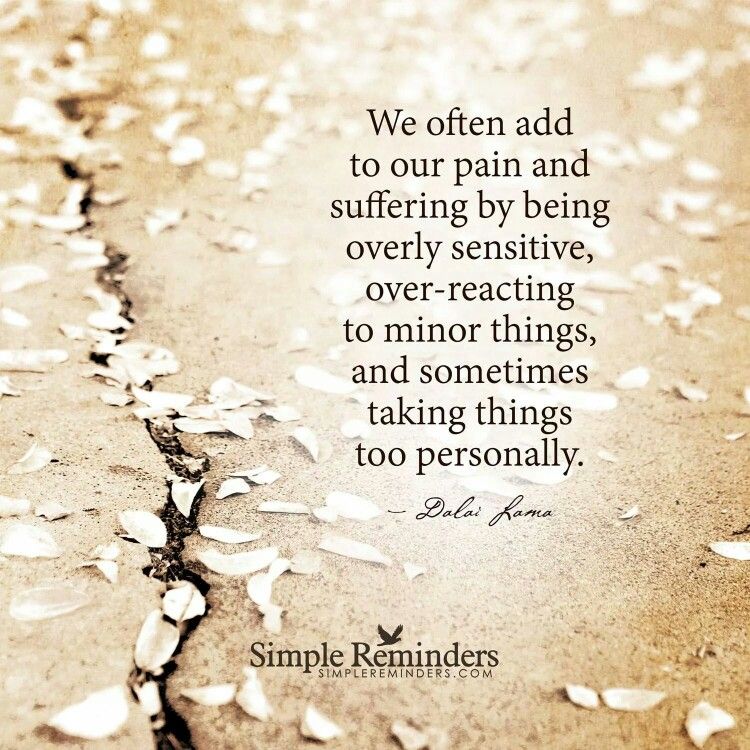
The official highly sensitive person website has directories of therapists, coaches, and medical professionals who are knowledgeable about HSPs. This can be helpful if you’re looking for a therapist for yourself or a highly sensitive loved one.
Your sensitivity can be a superpower. There are many benefits of being a highly sensitive person:
- being very empathetic to others, fostering deeper connection
- being highly self-aware
- being observant when it comes to yourself and others
- profoundly appreciating pleasant stimuli, including food, fragrances, music, textures, and more
- being deeply moved by heartwarming and positive stories, books, and movies
- cultivating gratitude for the “little things” in life, in part because you notice and experience them keenly
Learning to route your sensitivity toward something positive can be extremely helpful. Often, this starts with accepting your heightened perceptivity and reaching out for help if you need it.
If you feel that you’re “too sensitive,” there might be reasons for your sensitivity. In many cases, it’s simply a part of your personality and not something to try and change.
While your sensitivity can cause overwhelm and lead to challenges, it can also be a strength. Learning about your perceptivity can help you harness this strength to benefit yourself and others.
If you feel that you need emotional support, you can start by reaching out to a therapist.
Help Me Understand: Why Am I So Sensitive?
Do you ever find yourself wondering why you’re so sensitive? If you feel things deeply, you may be a highly sensitive person.
Sensitivity is often framed as a negative personality trait. You may have been told that you’re too sensitive or overemotional and that you need to “toughen up.” Maybe you wonder, why am I so sensitive?
It’s important to understand that sensitivity is a personality trait. Being “too” sensitive is not a disorder. Like being quiet or being thoughtful, it’s not necessarily a bad trait, even though each can pose its challenges.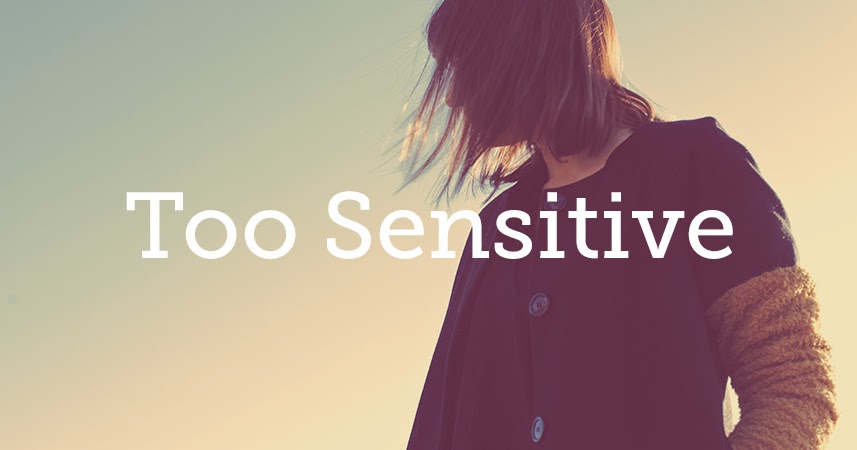
Several potential causes of sensitivity exist. For example, if you have a neurodevelopmental disorder like autism or ADHD, you might be more sensitive to certain stimuli.
Your sensitivity may not be linked to any particular disorder, though. If you feel things deeply, you could be a highly sensitive person (HSP).
Do you feel a cold coming on before outward symptoms show up? Do you notice that a lamplight is about to go out a day or two before it does because of slight dimming? Or are you deeply moved by someone else’s good or bad news just by picking up on their subtle expressions?
Why am I so emotional?
There can be many different reasons. Sometimes, we become more emotional when we go through difficult or stressful times. Recent bereavement, trauma, and stress can make us feel more emotional.
Some people tend to be emotionally sensitive because it’s a part of their personality. A highly sensitive person is someone who feels things strongly, whether those things are positive or negative.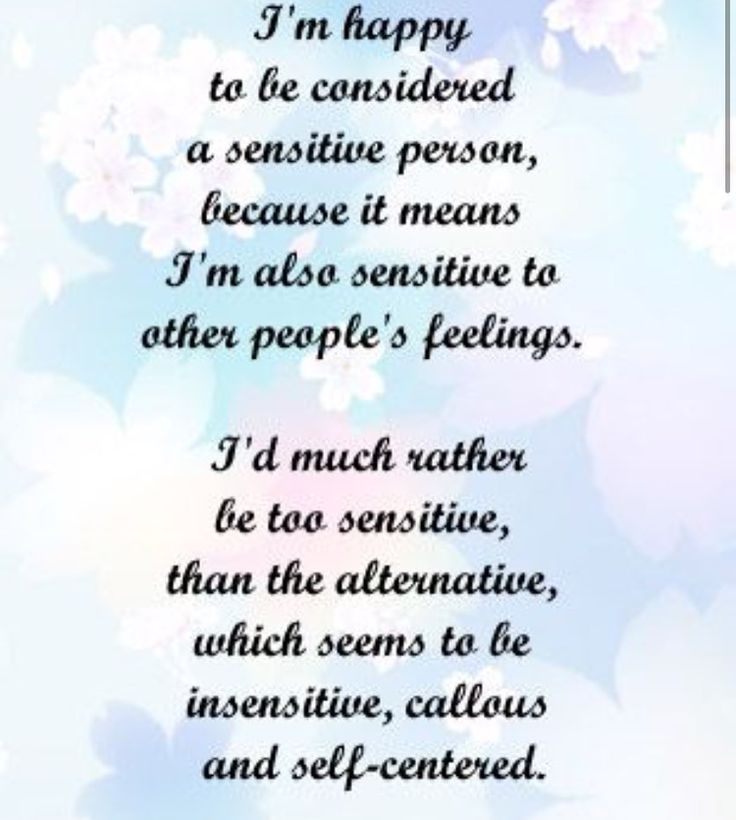 This can include their own emotions, the emotions of others, and sensory stimuli in the world around them.
This can include their own emotions, the emotions of others, and sensory stimuli in the world around them.
A note on being highly sensitive vs. exceptionally emotional
We often use the words “sensitive” and “emotional” interchangeably. And indeed, highly sensitive people are more attuned to emotions.
One of the main distinctions between being exceptionally emotional and being highly sensitive is that highly sensitive people are very attuned to their emotions as well as the emotions of others.
Highly sensitive people also tend to be more sensitive to external stimuli, like lights, noises, and colors, as well as internal stimuli, like hunger and pain.
Another difference is that being highly emotional could be temporary while being a highly sensitive person is a part of your personality.
If you’ve been feeling emotional lately, several stressors could be contributing to it.
Highly sensitive people often feel emotions and respond to stimuli — both in themselves and others — profoundly.
About 15–20% of the population is thought to be highly sensitive.
While many highly sensitive people are dismissed as “too sensitive,” their perceptiveness can be a strength.
The discovery of the HSP
The term “highly sensitive person” was popularized by clinical psychologist Elaine N. Aron, who wrote the book “The Highly Sensitive Person: How to Thrive When the World Overwhelms You.”
First published in 1996, this book is based on years of Aron’s research into being a highly sensitive person herself.
Sensory processing: Like being a human sponge
HSP are folks who are strong in a personality trait known as sensory processing sensitivity. This is not a disorder or a mental illness, but rather a part of your personality.
Sensory processing relates to how you take in stimuli, including sounds, sensations, others’ moods, smells, and more. HSP often experience these stimuli easily, absorbing like a sponge.
In daily life
If you’re highly sensitive, you might be deeply bothered by violent movies or graphics. You might also be easily overwhelmed by a busy or noisy environment, such as a crowded mall or business conference.
You might also be easily overwhelmed by a busy or noisy environment, such as a crowded mall or business conference.
Or, you might be able to savor pleasant stimuli intensely — a good meal, a wonderful song — on a deeper level. Your sensitivity to others’ feelings might help you cultivate strong relationships.
Understanding your sensitivity can be the key to managing overwhelm and leaning into the pleasurable aspects of being an HSP.
Aron’s research found being an HSP is an innate trait, identified in over 100 species.
However, others might learn to be sensitive for several reasons. A traumatic event might put them on high alert, for example. Being sensitive to stimuli is also a symptom of conditions like ADHD and autism.
Over years of research, Aron identified a few common characteristics among highly sensitive people.
These traits include:
- having empathy toward others
- engaging in people-pleasing
- being sensitive to loud noises, chaotic scenes, and busy crowds
- often feeling overwhelmed by sensory stimuli or emotional experiences
- being sensitive to caffeine and medication
- having increased self-awareness
- being able to deeply savor and appreciate pleasant sensations
- avoiding violent and tense movies or books
- avoiding overwhelming situations
- often needing to retreat into a relaxed, quiet space
- having strong emotional responses
Not all HSP will have all the above traits. Therapy and self-work can help you address some of the more harmful tendencies or unpleasant experiences.
Therapy and self-work can help you address some of the more harmful tendencies or unpleasant experiences.
Contrary to what many people assume, highly sensitive people are not always introverted. It’s estimated that around 30% are extroverts.
If you think you might be a highly sensitive person, you can take the official quiz on their website here.
To be clear, you can’t (and might not want to!) stop being sensitive, but you can manage your responses to your sensitivity.
While many people may ask themselves “Am I too sensitive?,” it’s important to note that being a highly sensitive person is not a disorder and nothing to be ashamed of. It’s simply a unique trait, just like being tall or light-haired.
Being a HSP can be difficult and overwhelming for some people, especially if you don’t understand your sensitivity. But you might find it liberating to harness and channel that perceptivity.
Psychotherapy to help channel your sensitivities
Talk therapy, also called psychotherapy, can help you learn to cope with the challenges of being an HSP while cultivating the positive parts of your sensitivity.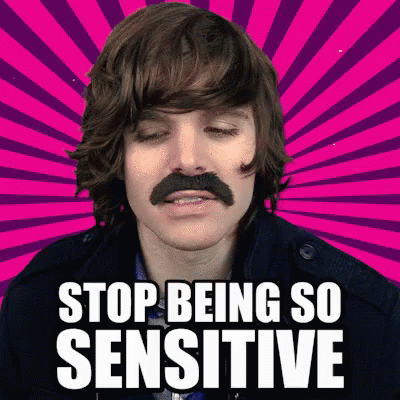
The official highly sensitive person website has directories of therapists, coaches, and medical professionals who are knowledgeable about HSPs. This can be helpful if you’re looking for a therapist for yourself or a highly sensitive loved one.
Your sensitivity can be a superpower. There are many benefits of being a highly sensitive person:
- being very empathetic to others, fostering deeper connection
- being highly self-aware
- being observant when it comes to yourself and others
- profoundly appreciating pleasant stimuli, including food, fragrances, music, textures, and more
- being deeply moved by heartwarming and positive stories, books, and movies
- cultivating gratitude for the “little things” in life, in part because you notice and experience them keenly
Learning to route your sensitivity toward something positive can be extremely helpful. Often, this starts with accepting your heightened perceptivity and reaching out for help if you need it.
If you feel that you’re “too sensitive,” there might be reasons for your sensitivity. In many cases, it’s simply a part of your personality and not something to try and change.
While your sensitivity can cause overwhelm and lead to challenges, it can also be a strength. Learning about your perceptivity can help you harness this strength to benefit yourself and others.
If you feel that you need emotional support, you can start by reaching out to a therapist.
What to do if you are too sensitive. And this is noticeable
Heightened emotionality is no longer a sign of weakness - it is a feature of the psyche. The existence of highly sensitive people has been scientifically proven. In a world where more and more people cannot cope with stress, American psychologists are closely studying those who are especially prone to worry about any reason. "Lifestyle" offers to join them.
If you can't stand bright lights and turmoil around you, you can't watch horror movies, and after watching the news about an earthquake or a military conflict, you begin to cry out of pity for the victims, you are a highly sensitive person. According to the author of the term Elaine N. Aron, there are about 20% of people like you in the world. This means that it's time to stop hiding your feelings and no longer be ashamed of crying in the movies. nine0003
According to the author of the term Elaine N. Aron, there are about 20% of people like you in the world. This means that it's time to stop hiding your feelings and no longer be ashamed of crying in the movies. nine0003
In today's Western world, it's a shame to be a weakling — and that's why we have to hide our feelings, constantly keep in good shape, pretend that we can live without lunch and sleep and work 12 hours a day, otherwise our colleagues will look askance at us , and the authorities - to make jokes about us.
In our country, it is not customary to be capricious, and that is why we are forced to agree to the conditions that we have, to work in a basement or open space, under the wind of an air conditioner, under the harsh light of fluorescent lamps and under the cries of colleagues from neighboring departments. nine0003
close
100%
Are we suffering from all this? Yes, we suffer. In general, we suffer from a lot of things: we can’t stand the feeling of hunger, we can’t watch films about the war, we don’t wear woolen clothes because they prick, we tear off the tags from T-shirts because they get in the way. We cannot work when it is cold, hungry or noisy, we react sharply to criticism and take any comments personally, we catch changes in the mood of others. It remains to say who we are. nine0003
We cannot work when it is cold, hungry or noisy, we react sharply to criticism and take any comments personally, we catch changes in the mood of others. It remains to say who we are. nine0003
We are highly sensitive people. Do not rush to laugh and call us sissies - and not only because it is very offensive to us.
You may also be one fifth of the world's population, which is characterized by a particularly sensitive processing of sensory information. Then you are one of us.
Perhaps you, too, were forbidden to watch the news program as a child, because they show war and starving children in Africa? Maybe you were dying of shame when a geographer slapped you a deuce once in your life? Maybe they hated running and, in general, any form of competition, when everyone is looking at you, and you run no more than a three? Maybe at school it was a real torment for you to raise your hand in class, even if you knew exactly the right answer? Maybe. Or maybe you have other examples from your childhood that will help you to say that you were a highly sensitive child and probably grew up to be a highly sensitive adult as well. nine0003
nine0003
The term "highly sensitive person" was first used in its current sense by Dr. Elaine Aron, a scientist and author of The Highly Sensitive Person, published in the United States in 1997. The hypothesis that high sensitivity to external stimuli is a feature inherent in about 20% of the inhabitants of the Earth was put forward by a psychologist twenty years ago.
However, the real interest in this idea has awakened among the public only now, when it became clear that more and more people can not cope with stress. nine0003
And I woke up just in time: for twenty years, Dr. Aron and her colleagues have done a lot of research that helped to understand what processes occur in the brain of a highly sensitive person, and to conclude that this feature is innate: certain parts of the brain of such a person react to external stimuli sharper than other, less sensitive people.
And not only negative ones, but also positive ones too. Yes, highly sensitive people feel acute discomfort in awkward situations.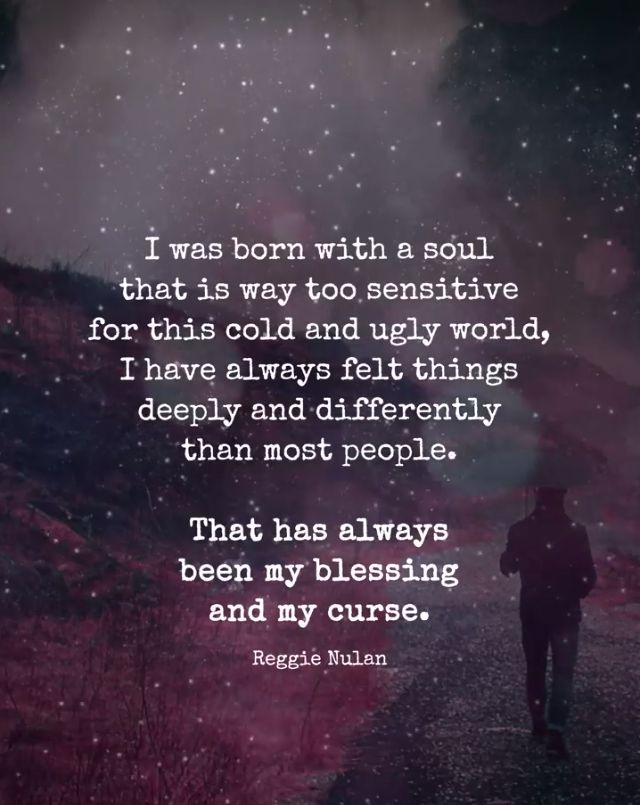 But brighter experience the pleasure of contemplating objects of art and views of nature, listening to music, communicating with pleasant people. nine0003
But brighter experience the pleasure of contemplating objects of art and views of nature, listening to music, communicating with pleasant people. nine0003
How to know that you are a highly sensitive person
close
100%
1. You have deep feelings
One of the main characteristics of highly sensitive people is the ability to deeply feel what is happening around. They have developed intuition, which allows them to be more perceptive than their less sensitive comrades.
2. You react more emotionally than others
Highly sensitive people experience more intense emotions and are often infected by the emotions of others. These are not necessarily close people, they can easily pick up a bad mood from a friend or take care of a colleague's problems. This makes them hate delivering bad news or making unpopular decisions – they worry about how others will react to it. nine0003
3. You are often told: “Don't take it personally.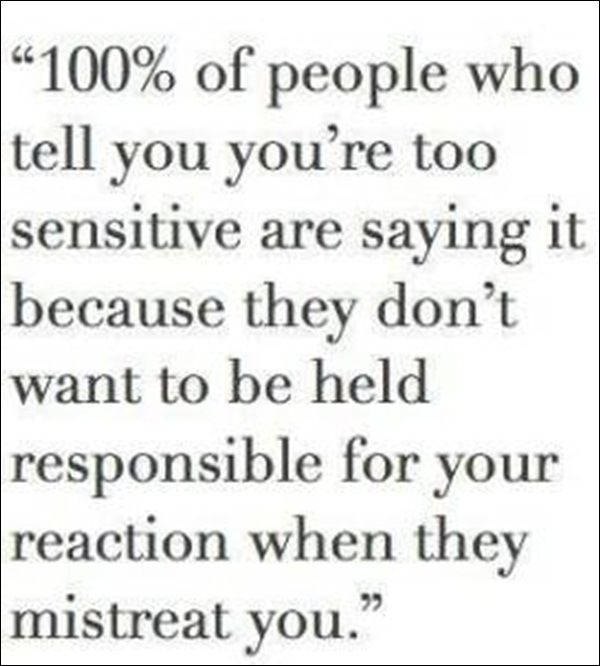 ”
”
Sensitive people are treated differently in different cultures: if in the West emotionality is a manifestation of weakness, then in the East everything is not so simple.
Dr. Ted Zeff, author of The Highly Sensitive Person's Survival Guide, states from his research that in India and Thailand sensitive men are very rarely teased, while in North In America, men with a fine mental organization are often the objects of ridicule. nine0003
4. You prefer to exercise alone
Highly sensitive people hate team sports, according to Dr. Zeff. And our experience confirms this: such people like cycling, swimming or walking, but playing football or basketball causes them to panic.
However, there are exceptions: if such a person is lucky with smart and understanding parents, he may not be afraid to show himself in a team.
5. You find it difficult to make elementary decisions
Highly sensitive people are attentive to the details of the situation and the subtleties of circumstances.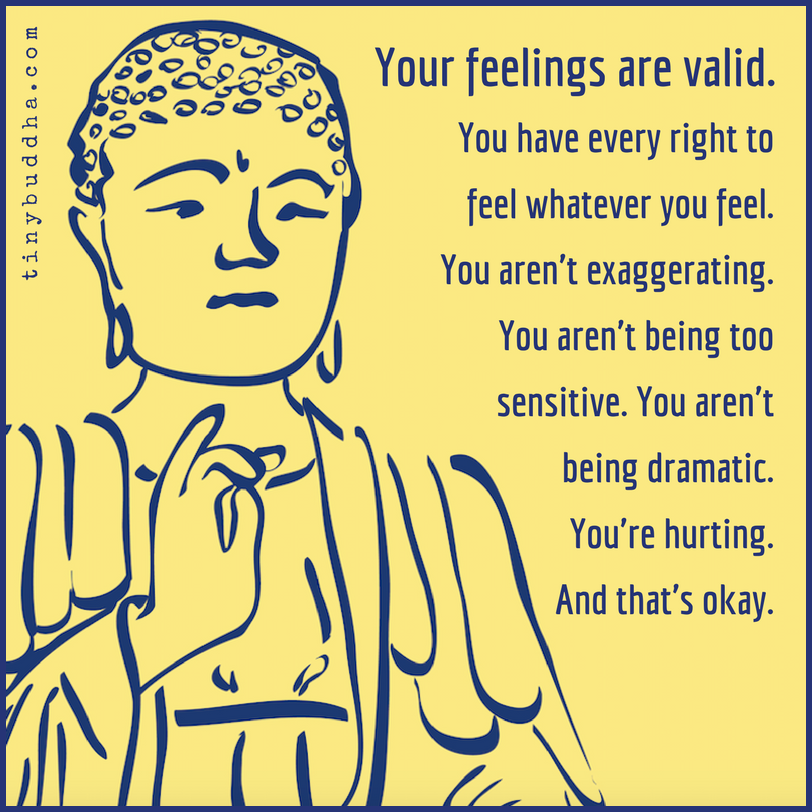 From this, they try to take everything into account and fall into a stupor, because there is too much of this.
From this, they try to take everything into account and fall into a stupor, because there is too much of this.
Even the task of choosing an ice cream can confuse them. However, there is good news: having once understood how to behave in a certain situation, in similar conditions in the future, such a person, without getting lost, will immediately do the right thing. nine0003
6. You get upset when you make a mistake
Mistakes upset everyone, but highly sensitive people - especially: because of annoying little things and oversights that others have forgotten to even think about, they can suffer for weeks, imagining that they still remember the mistake.
7. You are an introvert
But there are exceptions: according to Dr. Aron, 30% of highly sensitive individuals are extroverts. This happens when a person grows up in a closed environment where everything is in plain sight, in a village, a small town, a religious community or a family of a public person. nine0003
nine0003
8. You know how to work in a team
Paradoxically, but true: the depth of experience makes highly sensitive people excellent workers. Only they should not take positions in which they must make final decisions: for example, if it is a doctor, he should have the opportunity to consult with colleagues before prescribing treatment.
9. You are prone to anxiety and depression
This only happens if you have experienced a lot of adversity in the past - but who among us is lucky to do without them at all? Shy people are often teased in childhood: if a highly sensitive person was not given proper support in childhood, he grows up with the feeling that the world is hostile, and only doctors and antidepressants can help here. nine0003
It is worth taking a closer look at your child: high sensitivity is often inherited.
10. You can't stand sharp sounds
Someone can't stand it when Styrofoam squeaks on glass. Someone - the sound of a perforator or drill. It annoys someone when others eat loudly: champing and smacking is really impossible to endure, why do people even allow themselves to eat with their mouths open ?!
It annoys someone when others eat loudly: champing and smacking is really impossible to endure, why do people even allow themselves to eat with their mouths open ?!
11. You can't see the violence on the screen
A highly sensitive person cannot watch horror films about dismemberment, disaster films about drowning dogs, and arthouse about rape. Lars von Trier, Gaspar Noe and Michael Haneke are cinematic enemies.
Salo by Pier Paolo Pasolini? Look in your VGIK, and it’s enough for us to read the plot.
But you can watch Game of Thrones by closing your eyes in certain places, because the costumes are beautiful.
12. You can cry from scratch
When such a person is offended to tears for some reason, he is really capable of bursting into tears. And, by the way, it costs him a lot of effort not to do this. A sad film (without violence), a touching commercial for a charity campaign, a story about a penguin who annually comes to the Brazilian (or Chilean?) who saved him - in general, anything can cause a surge of feelings.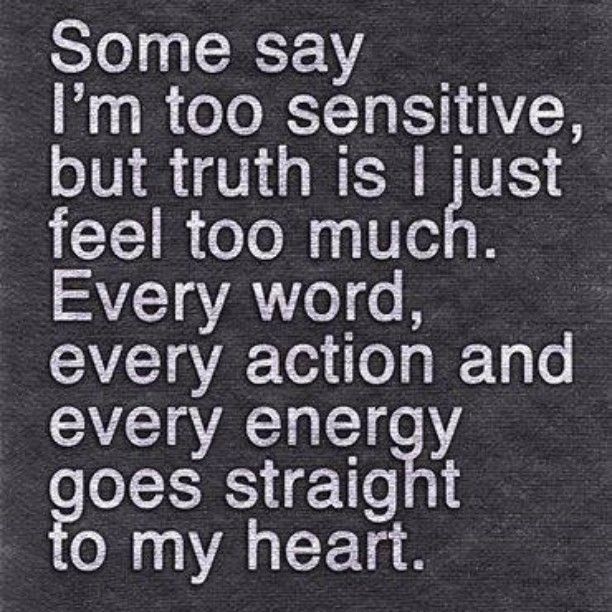
13. You are very polite
Good manners are a hallmark of highly sensitive people: it is important for them not to hurt the feelings of others. They try not to inconvenience others: they regularly give up their seats on public transport, carefully place their carts in the supermarket, let people go ahead, and endlessly apologize and thank you. So sometimes it's even annoying. nine0003
14. You are sensitive to criticism
Highly sensitive people literally cannot stand criticism, taking it to heart. When criticized by their team, they take everything personally.
Because of this, they often use ridiculous defense mechanisms: they try to please everyone in advance, they criticize themselves, they avoid everything that can be a source of criticism.
Dr. Aron claims that self-defense such people use the following methods, which may seem strange to most: minimizing contact, blaming, trying to achieve too high a result, resentment, projecting, refusal to compete. nine0003
nine0003
15. You can’t work in an open office
Open space is a nightmare for any office employee: noise, bright light that not everyone can stand, constant flickering, talking on the phone, disputes and extraneous smells - all this makes you a highly sensitive person's head is spinning, but it does not work out in any way. He is generally incapable of working under pressure: maybe someone needs a good kick to start working, but not for him.
close
100%
10 Rules for a Highly Sensitive Person
1. Remember that you are not alone and that what happens to you is normal.
2. Avoid people you don't like.
3. Avoid situations that tire you.
4. Don't overload your schedule or you may fall off at the most inopportune moment.
5. Set healthy boundaries with people who use your capacity for empathy.
6. Keep a diary to help you clear your head and learn how to make decisions.
7. Enjoy good music, art, and people who support you.
8. Find time every day to relax: take a bath, meditate, go for a massage, sit quietly with a book. Alcohol in this sense is a bad option for relaxation: you get tired every day, but you can’t drink every day.
9. Find opportunities to be alone. nine0003
10. Take care of yourself: you need to take care of yourself in the same way as you take care of your loved ones.
Close to the heart: what is high sensitivity and how to live with it
Health
© Eternal Happiness/Pexels
Author Varya Borodina
04 February 2020
Intolerance to noise, fear of the crowd, acute experience of any failure and increased emotionality - all this can be experienced by highly sensitive people. We understand why they are like that and what science knows about them. nine0003
"You take everything too close to your heart" - these words have been heard by everyone whom nature has endowed with high sensitivity. Science has long ignored the anxieties and concerns of vulnerable people, but in the last ten years the doctrine of sensitivity has become a trend, and at the end of the 2010s it moved into the mainstream.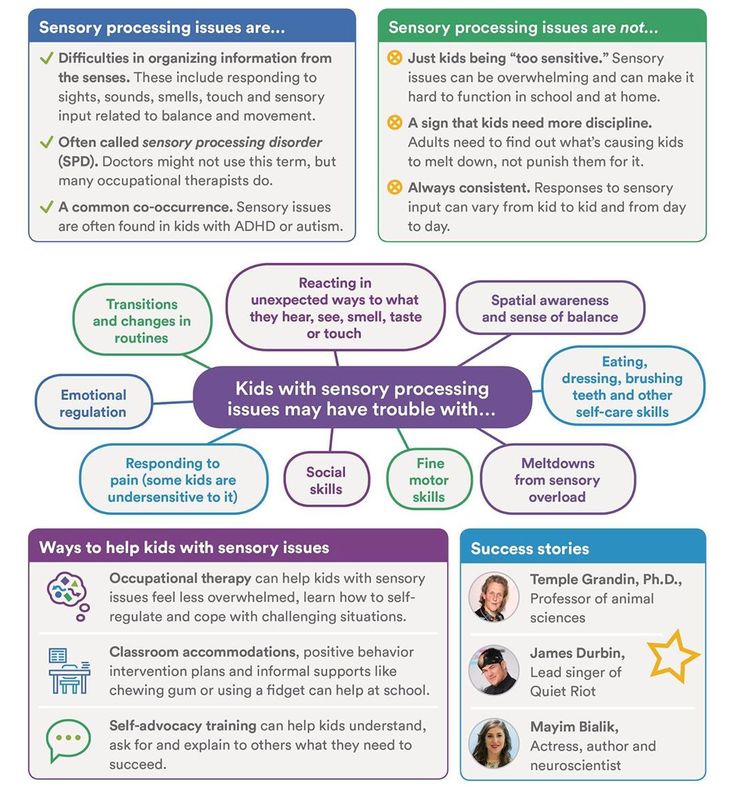 One of the first books on this topic is “Supersensitive nature. How to Succeed in a Mad World” by psychologist Elaine Ayron has become almost a classic of popular psychology literature today.
One of the first books on this topic is “Supersensitive nature. How to Succeed in a Mad World” by psychologist Elaine Ayron has become almost a classic of popular psychology literature today.
The abbreviations HSP and SPS can often be found in the Western press. The first is called Highly Sensitive Persons, and the second refers to the reason that makes them so fragile. The central nervous system of some people is literally more sensitive—it responds more strongly and processes physical, emotional, and social stimuli more deeply. This phenomenon is called Sensory Processing Sensitivity. nine0003
To understand how sensitive you are, you can take a test that measures four parameters: the depth of information processing, a tendency to nervousness, emotional reactivity and the ability to read between the lines (catch the nuances of phenomena, situations, characters).
Advertising on RBC www.adv.rbc.ru
Highly sensitive people are more likely to indulge in reflection, worry more about other people, themselves, the future and the whole world, it is difficult for them to make decisions, accept criticism, and they can also suffer in a loud and fussy environment. Therefore, they are even called “new introverts”, but do not confuse the concepts - sensitive people may well be extroverts, they just react more sharply to everything that happens in the world. It does not follow from this that high sensitivity is a disadvantage. This is just a personality trait that can be made into an advantage. nine0003
Therefore, they are even called “new introverts”, but do not confuse the concepts - sensitive people may well be extroverts, they just react more sharply to everything that happens in the world. It does not follow from this that high sensitivity is a disadvantage. This is just a personality trait that can be made into an advantage. nine0003
From anxiety to vivid emotions
Emotional reactivity indicates the ability to respond more sharply to external stimuli. It may manifest itself in different ways. On the one hand, a person deeply experiences failures and reacts sharply to gross physical stimuli (unpleasant music, pushing, screaming, etc.). But this same reactivity helps to experience positive emotions more vividly and makes even the most everyday life more intense. Concerts, festivals, fireworks and colorful shows, travel and outdoor activities, spiritual conversations with loved ones, spiritual practices, simple joys like delicious food and strong hugs - all this a highly sensitive person lives brightly, from the bottom of his heart. nine0003
nine0003
From indecisiveness to balance
According to Elaine Ayron and her colleagues, highly sensitive people have a harder time making decisions. Excessive attention to details interferes with making a decision: a person digs into the nuances, makes endless lists of pros and cons, and eventually slides into painful rumination (scrolling the same thoughts with negative overtones). Considering that many sensitive people have a hard time with criticism, they are especially afraid of making the wrong decision. nine0003
However, the ability and desire to analyze is a useful skill in life and at work. Such a person is a valuable member of the team, because it is he who will be able to painstakingly study all aspects of an important issue, calculate risks and notice nuances that are invisible to others. Because of their attention to detail, highly sensitive people are the first to notice changes in a friend's or partner's behavior, work environment, and market situation.
© Guilherme Stecanella/Unsplash
From fragility to empathy
Among highly sensitive people there are many introverts who prefer cozy loneliness or a chamber society of two or three close people to group activities and noisy parties. They often choose solo sports, try to protect themselves from the informational noise (especially from the negative). Many of them dislike horror and psychological thrillers, have a hard time dealing with stories of violence, and try to avoid toxic people in real life. This is because highly sensitive people are, for the most part, amazing empaths. Usually they have high emotional intelligence, they are able to empathize, understand and feel the emotions of another person with amazing accuracy. nine0003
They often choose solo sports, try to protect themselves from the informational noise (especially from the negative). Many of them dislike horror and psychological thrillers, have a hard time dealing with stories of violence, and try to avoid toxic people in real life. This is because highly sensitive people are, for the most part, amazing empaths. Usually they have high emotional intelligence, they are able to empathize, understand and feel the emotions of another person with amazing accuracy. nine0003
They are the same friends and partners who understand perfectly, find the best words of support, share grief and sincerely rejoice in the success of loved ones. If only for this reason, high sensitivity should not be considered a weakness - after all, it helps to build close and trusting relationships. And this, as numerous studies prove, is one of the main components of a healthy and happy life.
Things to take care of highly sensitive people (and everyone else)
In order to live in harmony with sensitivity and feel only its positive aspects, it makes sense to adjust the lifestyle in accordance with the needs of the body.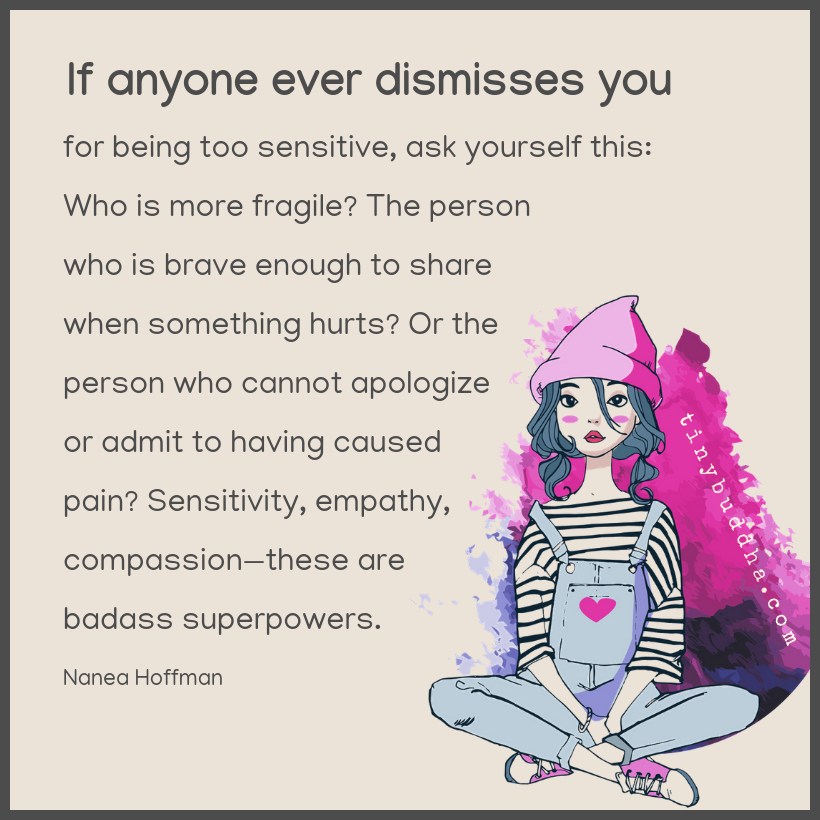 nine0003
nine0003
First, get enough sleep. In order not to loosen the already fragile nervous system, sensitive people should follow the routine and sleep hygiene. It is known that poor-quality sleep can lead to irritability, depression and melancholy - you should not provoke a fragile body.
Secondly, fast carbohydrates and caffeine should be limited. Sweets cause spikes in blood sugar and with them bursts of energy with sharp drops. Such an energetic rollercoaster can lead to severe mood swings. And caffeine and other stimulants can provoke hyper-emotionality and agitation. nine0003
Thirdly, you need to learn how to find time for yourself. People with hypersensitivity should plan in advance for "relaxing activities" - the time during which they can restore emotional strength and reboot. It can be a weekly hot bath, quiet evening walks, morning yoga, or seasonal trips to country hotels. Separately, it is worth taking care of rest after noisy holidays - birthdays, corporate parties, New Year's and so on.